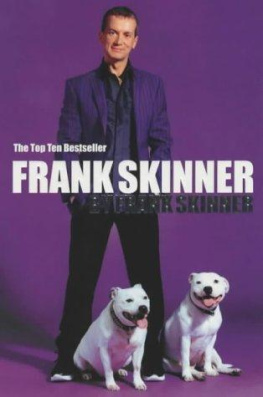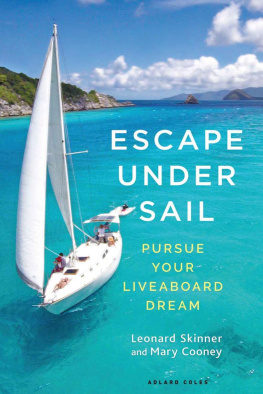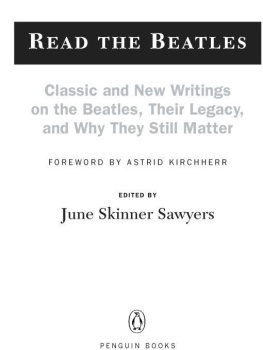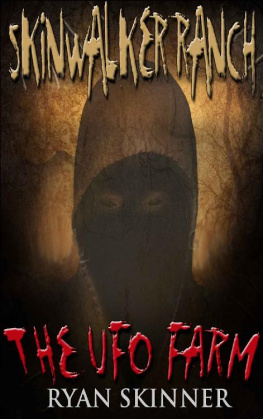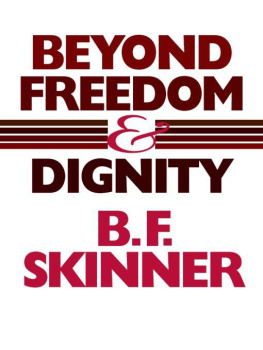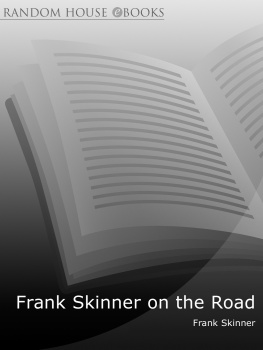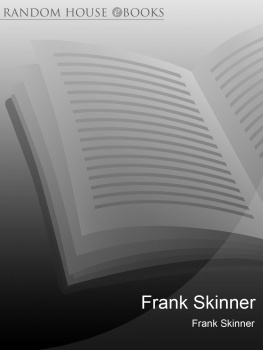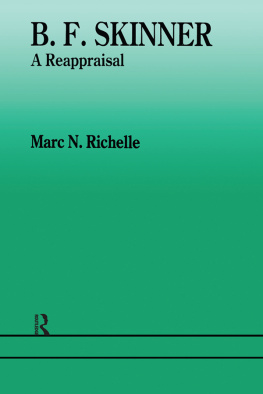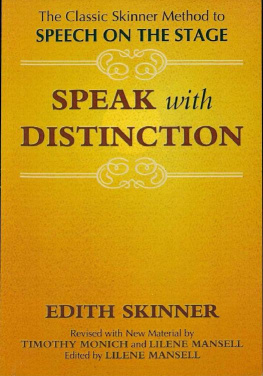Frank Skinner - Frank Skinner
Here you can read online Frank Skinner - Frank Skinner full text of the book (entire story) in english for free. Download pdf and epub, get meaning, cover and reviews about this ebook. year: 2002, publisher: Arrow, genre: Detective and thriller. Description of the work, (preface) as well as reviews are available. Best literature library LitArk.com created for fans of good reading and offers a wide selection of genres:
Romance novel
Science fiction
Adventure
Detective
Science
History
Home and family
Prose
Art
Politics
Computer
Non-fiction
Religion
Business
Children
Humor
Choose a favorite category and find really read worthwhile books. Enjoy immersion in the world of imagination, feel the emotions of the characters or learn something new for yourself, make an fascinating discovery.
- Book:Frank Skinner
- Author:
- Publisher:Arrow
- Genre:
- Year:2002
- Rating:4 / 5
- Favourites:Add to favourites
- Your mark:
- 80
- 1
- 2
- 3
- 4
- 5
Frank Skinner: summary, description and annotation
We offer to read an annotation, description, summary or preface (depends on what the author of the book "Frank Skinner" wrote himself). If you haven't found the necessary information about the book — write in the comments, we will try to find it.
Frank Skinner — read online for free the complete book (whole text) full work
Below is the text of the book, divided by pages. System saving the place of the last page read, allows you to conveniently read the book "Frank Skinner" online for free, without having to search again every time where you left off. Put a bookmark, and you can go to the page where you finished reading at any time.
Font size:
Interval:
Bookmark:
Born in January 1957 Frank grew up in Oldbury and Smethwick; West Midlands. After various jobs, he performed his first stand-up gig in December 1987 and went on to win the Perrier Award at the Edinburgh Festival. He is currently enjoying success with his own TV chat show.
by
IF I'm considering buying a book, I always take it off the shelf and read the first paragraph. This, I think, gives you a pretty fair inkling as to whether you'll like it or not. So, imagine the pressure I'm feeling at the moment. I suppose this has ended up in the Biography section and you are probably already eyeing up my competition: stuff like 'My Life in Music' by David Hasselhof or 'Fish in my rear-view mirror' by Teddy Kennedy. So, I know I have to work fast. I've never written a book before. In fact I've barely written a letter in the last ten years and even e-mails have become a bit irksome. I quite like text-messaging on my mobile phone, but it's not much of a warm-up for a 120,000-word autobiography. I even had text-message sex on one occasion. It was a long-winded but ultimately rewarding experience. At one stage in the proceedings I asked my fellow texter what was under her pants. The answer took the form of a vivid portrait in words that was three parts Jackie Collins and two parts Gray's Anatomy. I hadn't really expected such a wealth of detailed information. In short, I could almost smell it. Her message ended: 'What's under YOUR pants?' I replied, in all honesty, 'My knees.'
According to my own methods of purchase, if you are still with me at this stage, then the book is bought. Don't imagine this will lead to any falling away of standards. As far as I'm concerned, your outlay has forged a bond between us and I'm going to spend the rest of these pages telling you more about myself than I've ever told a best friend. You see, what I really like about the text-message story is that it's true. I really like true stuff. This is why I never read novels. I'm constantly plagued by the knowledge that they aren't true. If a novel begins, 'Martin lit a cigarette and considered the situation', I'm thinking to myself, no, he didn't. There is no Martin. So, I'm offering you the truth. The story of my life. This throws up a couple of problems.
Firstly, and I am not inclined to false modesty, I find it hard to imagine the kind of person who would be even slightly interested in my life story. I never stood toe-to-toe with Saddam or struck a power-chord at a stadium gig. I'm a nondescript bloke from a working-class family in West Bromwich, who got lucky, I've always been lucky. A friend of mine used to say that if I fell off John Lewis's roof, I'd drop into a new suit, and I know what he meant. On my thirtieth birthday, a mate's girlfriend asked me what it was like to be thirty and 'on the scrapheap'. Ten years later, I was doing a stand-up gig in front of five and a half thousand people, had my own chat show, and was at the core of a national phenomenon when me and two other blokes decided that football was coming home. How did all that happen?
This leads to the other problem. I've read the odd biography and I usually give up after about fifty pages because we're on chapter four and he's still at school. I hate all that early-life stuff. Who wants to know where his grandad was born and that his earliest memory was of staring at a stained-glass window at his auntie's house in Sudbury? By this stage I'm shouting, 'Hurry up and get famous, you bastard, or I'm switching to Hasselhof.' But, as Wordsworth said, 'The child is father to the man', so I feel I need to stick in a bit of relevant stuff from my pre-shaving years, just not in a big lump at the front. In fact, I don't see why the story needs to be in any particular order. We're mates now. You'll have to take me as you find me.
I also like books with lots of short little sections, bite-sized to suit the busy lifestyle common to so many people in this, the twenty-first century.
Can I just make a brief point about modesty? I really like modesty. I respect it. Modesty in others draws me to them. A lot of people would regard me as a winner but, for the first thirty years of my life, as my mate's girlfriend instinctively recognised, I was a loser. Thirty years is a long time. I still think like a loser. I still move like one. I'm OK with that. Losers are often very nice people, well, compared to winners.
Unfortunately, the nature of autobiography means I have to talk about myself, at length. I'll have to say 'I did this' and 'I said that'. Sorry. Worst of all, as with the text-message story, I'm going to have to quote my own jokes. Now, as much as I love hearing them quoted by others, it is impossible to quote your own gags without sounding like a tosser. What can I do? I'm stuck with it.
The closest I've previously got to being 'biographed' was getting done by This is Your Life. It was a strange dream-like experience. I was doing a gig at the London Palladium. It had been a bit of a stormer and, as I took my bows at the end after an hour and a half of fairly tasty stand-up, I was feeling pretty good. Happily, there was a lot of really loud cheering but then, in the midst of all this, there was a sort of secondary cheer which went up, even louder than the first one. Wow, I thought, they REALLY love me! Turned out the much louder secondary cheer was for Michael Aspel, sneaking on behind me. To be honest, I was a bit startled when, out the corner of my eye, I caught sight of him. Michael and I exchanged pleasantries before I was dragged off to my dressing room and locked in so I didn't accidentally bump into any surprise guests. Meanwhile, they prepared the Palladium stage for This is Your Life and, to my amazement, the crowd hung around till 1.00 a.m. to witness the event.
It occurs to me now that this is quite a nice way to structure a biography: the comedian locked alone in his dressing room, waiting to be 'This is Your Lifed', and naturally he begins to reminisce until, 120,000 words later, he is awakened from his nostalgic meanderings by a knock on the door, 'Mr Skinner, we're ready for you now.' And he strides out into the bright light to be greeted by a deafening roar that is less about admiration and more about love. Thus, I tell my tale like the old gal who used to be Kate Winslet does in Titanic. As I say, it's a nice way to structure an autobiography. But ... I don't fancy it.
Something struck me as I sat locked in my dressing room that night. My big surprise shouldn't have been a surprise at all. I had had a phone message in the early hours of that morning telling me that Michael Aspel was going to be at the Palladium that night, and that I was his victim-to-be. It never occurred to me for one second that it might be true. It had, after all, been a strange week on the crazed messages front. On the previous Monday night, I did a gig in Oxford. When I left the building at around midnight, a female fan had written a lewd message in lipstick on my windscreen. It offered me 'anal sex with no complications' if I cared to visit her that night. There was a phone number but the woman was clearly a nutter. I mean, you should have seen the state of her lounge.
Anyway, I barely noticed the phone-message. It never occurred to me that I might be This is Your Life material. Why would they be interested in me? (I sense you're already getting fed-up with the modesty thing.) The words 'scraping' and 'barrel' should have come to mind but they didn't. I discovered a few days later that the phone-call had come from a couple of former colleagues from my comedy-club days, Malcolm Hardee and Jim Tavare. Malcolm knew about my special night because he was due to be a guest on the show. He was dropped when the producer heard about the phone-call. Malcolm actually had the cheek to turn up to the after-show party, but he completely redeemed himself in my eyes by performing a commando nerve-grip on Michael Aspel, causing the much-loved broadcaster to drop helplessly to his knees. I have the greatest respect for Mr Aspel but that is what I call comedy. If
Next pageFont size:
Interval:
Bookmark:
Similar books «Frank Skinner»
Look at similar books to Frank Skinner. We have selected literature similar in name and meaning in the hope of providing readers with more options to find new, interesting, not yet read works.
Discussion, reviews of the book Frank Skinner and just readers' own opinions. Leave your comments, write what you think about the work, its meaning or the main characters. Specify what exactly you liked and what you didn't like, and why you think so.

